Type City, bar name or keyword...
Keeping It Sustainable: The Spirits Doing Good For The Planet
“There is a widespread realisation that the clock is ticking and we must all act now if we are to avoid an environmental catastrophe." Those are the words of Lee Smith, founder of Cane & Able Spirits, and ya know what? The man is right.
The planet's getting hotter, sea levels are rising faster than a running bath left unattended, and if we don't sort our sh*t out, it's game over for our planet. But hey, we're not here to take Greta's job. We're here to tell you about awesome booze brands. These ones in particular are doing some pretty smashing things when it comes to sustainability.
Rum
Neptune Rum
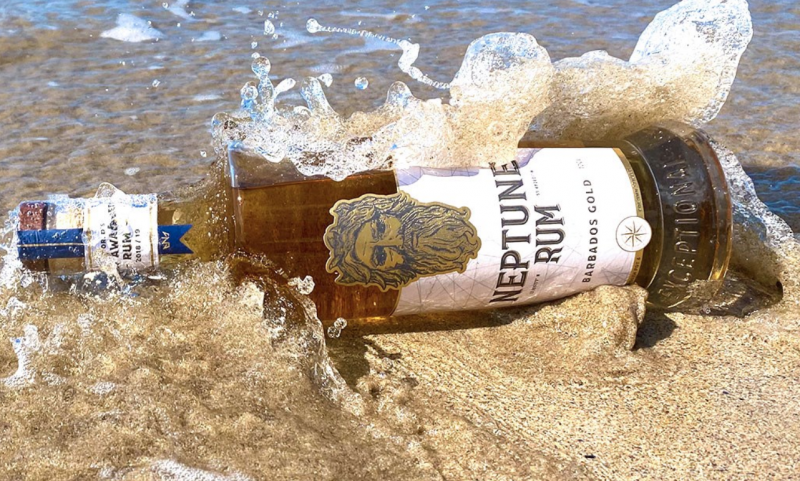
The crew behind this brand have combined the finest natural ingredients, centuries-old distillation methods and tropical ageing to create truly next-level Caribbean and Barbados rums. And speaking of the planet, sales of every bottle of Neptune Rum generate some pretty vital funds for projects that prevent, clean up and restore the Earth's oceans. From helping to fund the placement of Seabins (those cool sink-hole style bins that float on the sea's surface and suck in all the rogue plastics and rubbish) to supporting Surfers Against Sewage, which works to keep the UK beaches clean - they're all about raising awareness. Ya can't name a rum after the god of the ocean and not vow to protect it, after all.
Two Drifters Rum
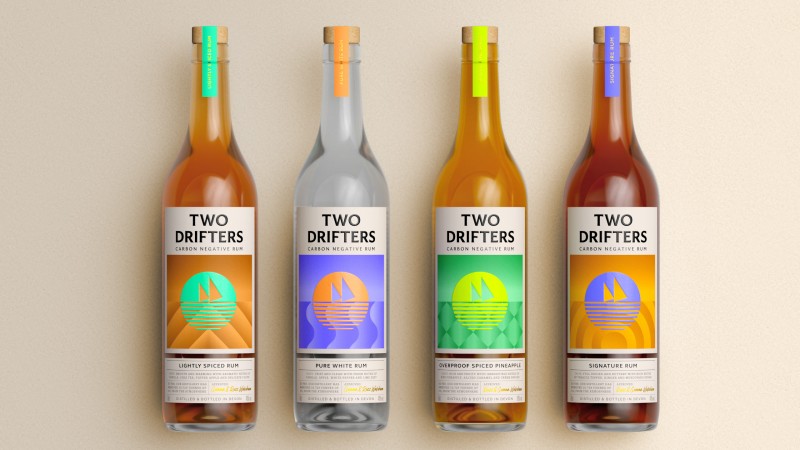
Ever heard of a carbon NEGATIVE distillery before? Well honey, ya have now. The Two Drifters cohort have sustainability running through their veins... and that's not 'cos they've been drinking too much of their own supply. Two Drifters Rum is made in the first distillery in the world to become carbon negative, but the mission for sustainability doesn't end there. They've upgraded their packaging with lighter, taller British-made bottles featuring a natural cork with FSC wooden top, 100% compostable tamper seal, and paper labels made from sugarcane fibre, hemp and linen. Oh, and they haven't stopped there. Even their website is sustainable, made with low carbon emission technology. Bravo, guys!
Lost Years Rum
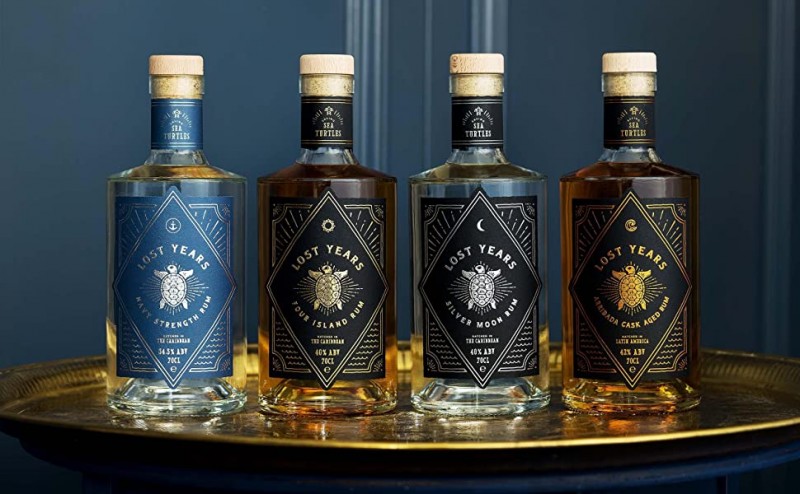
As well as having a plastic-free, clear, tamper-evident seal made from plant-based cellulose which composts in a matter of weeks; 100% recyclable cardboard delivery packaging; and lighter-than-average bottles, the Lost Years Rum team also have a few other priorities when it comes to making the planet that little bit better. These guys are all about saving baby sea turtles (google them, they're v cute) Every bottle of Lost Years purchased saves up to 10 baby sea turtles by supporting community-based conservation efforts at key nesting sites across the Caribbean and Latin America. Did we just help you justify buying a bottle of each of their four different rums? Yeah, thought so.
Whisky
Nc'Nean Organic Single Malt
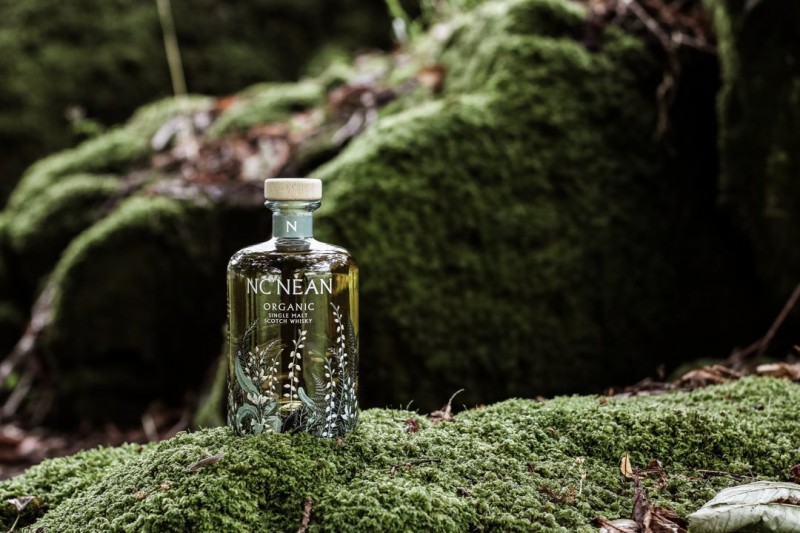
From the off, this awesome whisky distillery has done things the sustainable way. They're working with a "waste not, want not" kinda vibe; their leftover grain feeds the cows on the farm and the waste products are spread on the fields as fertiliser. And with whisky this delicious, they never waste a drop. This is Scotland’s leading organic whisky distillery and they use only renewable sources for its energy. The distillery has recently been verified as net zero (that means it's totally carbon neutral) for their ops, and the booze itself is totally certified organic. Of course, they've also made sure their clear glass bottle is 100% recycled, which is an industry first. BOOM.
Bruichladdich Distillery - Bruichladdich, Octomore & Port Charlotte Whiskies
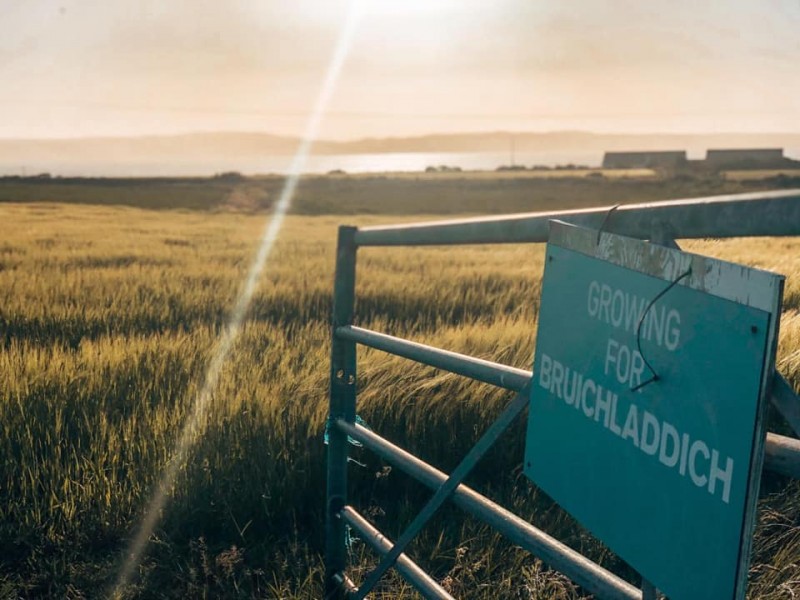
When it comes to producing spirits in a sustainable way, Scotch whisky producers have kinda been on the back foot. This is especially true in Islay on the west coast of Scotland, where in 2021, it was reported that the island's nine distilleries burn 15 million litres of oil each year, resulting in the highest per capita CO2 levels of any community in the country. Ooof. That's because they rely on fuel oil brought to the island on diesel-powered ferries. There ain't an easy fix - but Islay's Bruichladdich Distillery has set itself the challenge of ensuring a net-zero distillation process by 2025. The team's plan is to pioneer the use of a wicked new innovative type of green hydrogen production which uses green electricity and water electrolysis rather than natural gas. Their hope is that, if successful, the techniques they implement could help power Islay’s other distilleries, businesses and homes. Hell yeah!
Gin
Hyke Gin
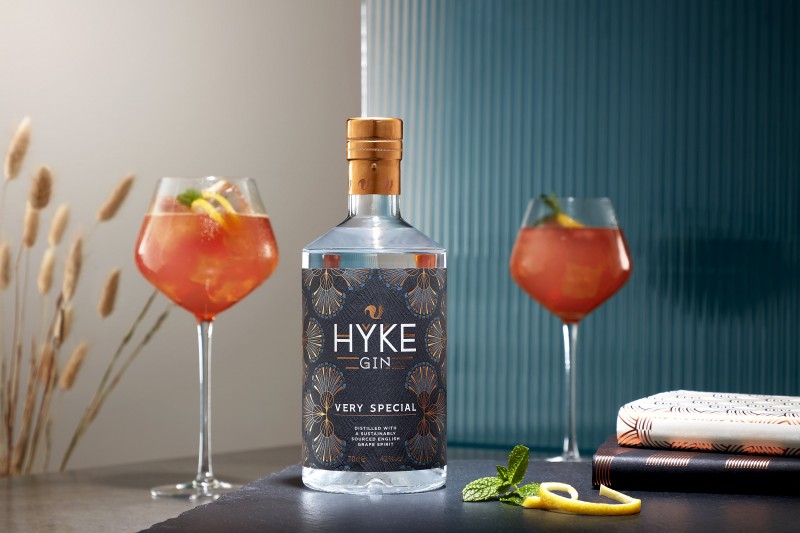
Not so fun fact: 30% of our food goes to waste. Either in supermarkets, restaurants or at home (yeah, we're talking about that bag of salad you've let go soggy in the bottom of your fridge). Foxhole Spirits, maker of Hyke Gin, does its bit to change that by tapping into the surplus table grapes market, which annually has approximately 713 tonnes of fresh table grapes not suitable for fresh consumption. The gin's base spirit is made from those surplus grapes, helping to reduce food waste in the supply chain. The producer has also hit up the English wine industry to take on the crushed grapes usually discarded to create Hyke Gin Very Special. The result? Two unique products which taste exceptionally delicious, are beautifully presented, sustainably conscious and still affordable. And no, they don't taste like wine, before you ask.
Mermaid Gin
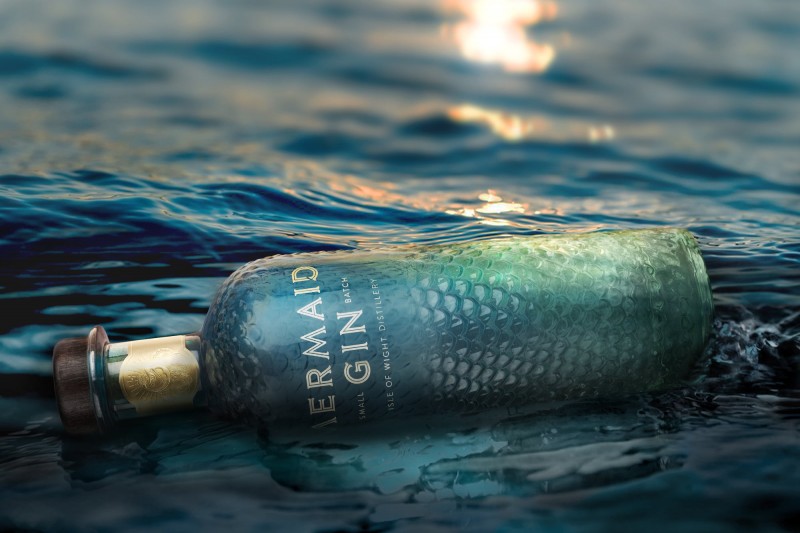
Have you ever seen a more beautiful bottle? The net-zero Isle of Wight Distillery has created a vessel just as gorgeous as the booze you'll find within it. These stunningly sculpted mermaid-tail bottles are exclusively made from sustainable materials and are totally plastic free. Each glass bottle is decorated with biodegradable paint and features an all-natural cork with a wooden top and paper seal. The gin itself has rock samphire as its lead botanical, known locally as "mermaid’s kiss". This aromatic succulent clings to the cliffs surrounding the island, so the team don't have to travel far to get it. Another win for the planet.
Cooper King
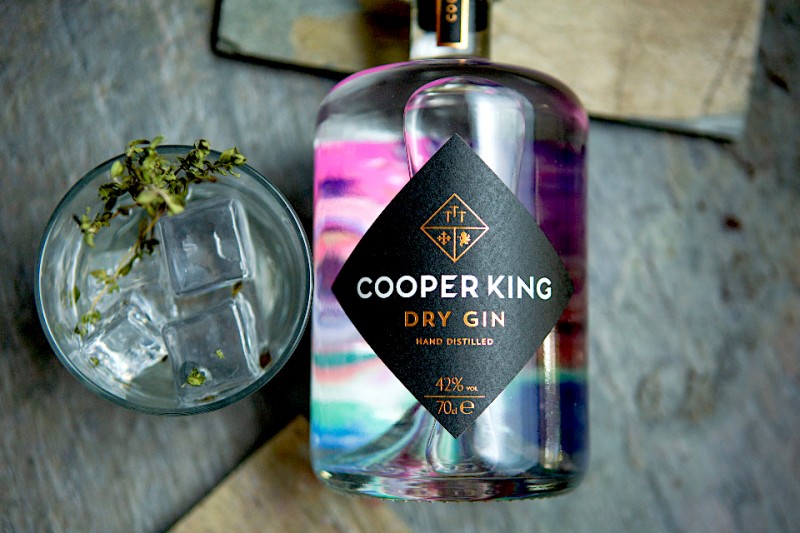
As one of only a handful of distilleries in the UK to run on 100% renewable energy from day one, it's safe to say the folks at Cooper King have sustainability at their core, and the stats they're rocking speak for themselves. Every 700ml bottle of Dry or Herb Gin they make removes one kilo of CO2e from the atmosphere, making them England’s first carbon-negative gin. One square metre of native broadleaf UK woodland is planted for every bottle of gin sold, thanks to their wicked charity partnership with the Yorkshire Dales Millennium Trust, and they've planted over 15,000 square metres of managed woodland so far. Holy moly. That all sounds impressive, but they reckon moving to a green energy supplier is the single biggest thing they've done to tackle climate change. It’s more expensive, sure, but hugely reduces the environmental impact of operations, supports Britain’s energy independence, and reduces reliance on fossil fuels. These guys are killing it.
Vodka
Koskenkorva Vodka Climate Action
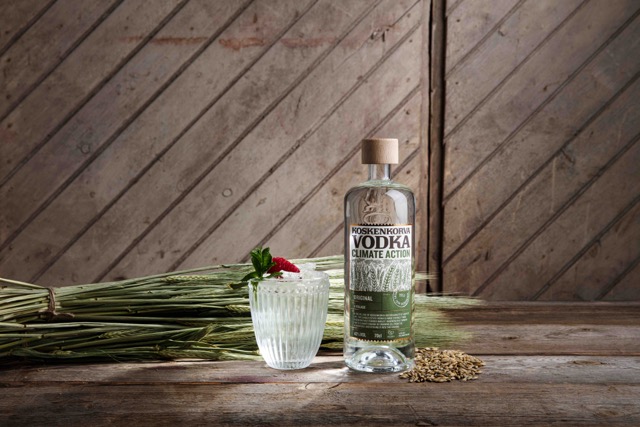
Fly less. Upcycle furniture. Grow food. Drink… vodka? Yep - getting on the Martinis can actually save the planet. This vodka is a legit world first, and the clue’s in the name: Koskenkorva Vodka Climate Action. This Finnish producer makes its vodka using regeneratively farmed barley that helps fight climate change. This regenerative farming aims to remove CO2 from the atmosphere and store it in the ground, creating carbon sinks that reduce the impact of climate change. This isn't a "sweep it under the rug" solution - the process actually improves biodiversity, stops nutrients leaking into water bodies and provides better crops at the same time. If all the farmers in the world swapped to regenerative farming, they could remove up to 322 billion tonnes of CO2 from the atmosphere. That’s nearly as much as we emit globally in 10 years. Time to start following in some boozy footsteps, y'all.
Discarded Grape Skin Vodka
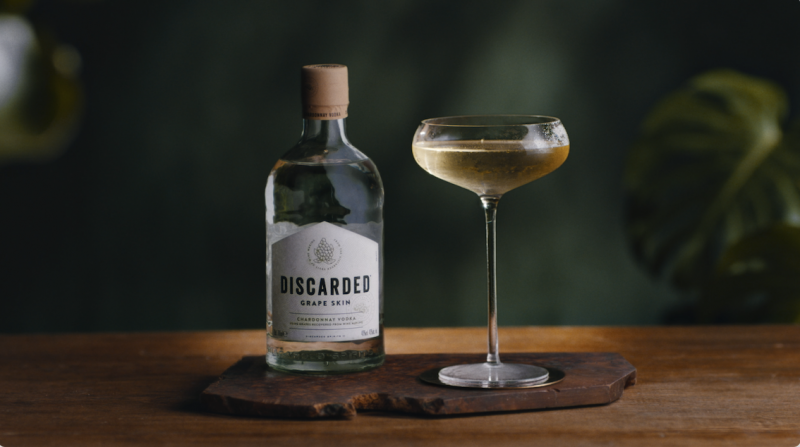
The lot at Discarded Spirits absolutely f*cking hate waste. They know that 70% of food and drink waste is avoidable, so they're doing whatever they can to actually avoid it. By reusing traditionally wasted ingredients, they've unlocked a new dawn for the spirits industry. They've proven the the point that almost everything can be made into something: grape skins, for example. Their Grape Skin Vodka is made by distilling all the parts of the winemaking process that are normally discarded: the skins, stems, the seeds… otherwise known as the pomace. If you don't think "I wonder if I could turn this into booze" the next time you chuck away a banana peel, you ain't Discarded's people - and tbh, you're probs not ours, either.
Black Cow English Strawberries Vodka
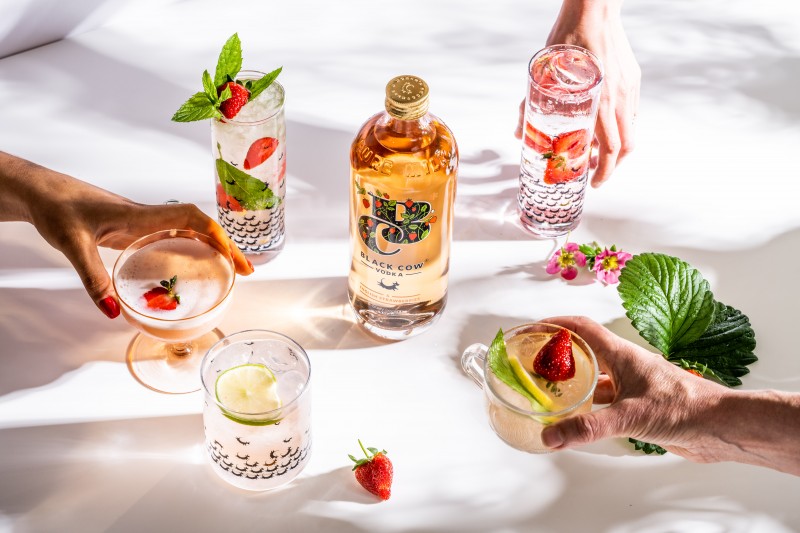
Ready for a v simple cheesemaking lesson? Here we go: When making cheese, the milk is separated into the curds and the whey. The curds are what get turned into cheese, and the whey... it gets thrown a-whey (sorry). Well, not at the Black Cow Distillery in Dorset. There, they collect up the leftover whey from making their Black Cow cheddar (which, btw, we could eat by the kilo), then they ferment, distil and blend it up to turn it into the "world’s smoothest" vodka. But their dislike for waste runs much deeper than whey. They caught on to the fact that often strawberries that didn't conform to a classic strawb shape ended up getting chucked, so they started to collect them, press them down and combine them with their creamy vodka to create Black Cow English Strawberries. Sort of like strawberries and cream in a bottle, made almost exclusively from products originally destined for the bin. Whey-hey!
Sapling Spirits
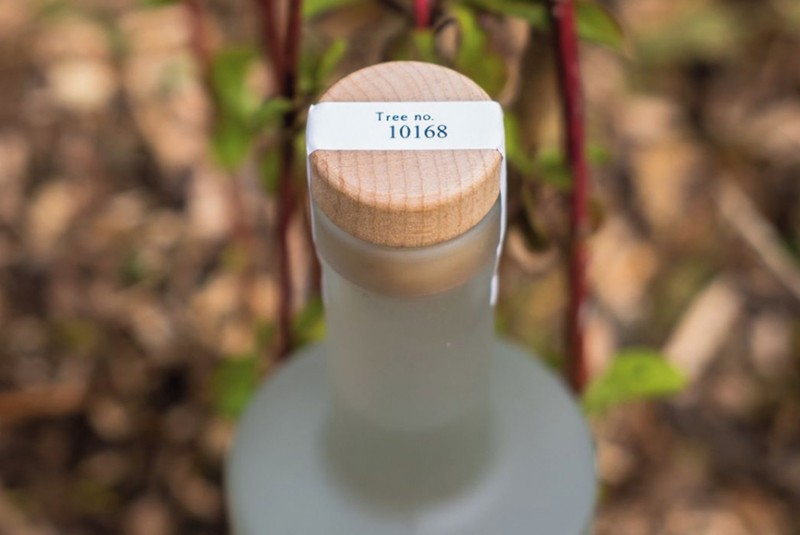
Image via: reve-en-vert.com
Sapling is a four-times distilled, charcoal-filtered vodka made right in the heart of London, using local ingredients to reduce transport emissions. For every bottle of this creamy, subtly sweet vodka you buy (perfect for a Martini), the producer plants a tree. And you don't just take their word for it, either. On each bottle a unique code tells you what tree was planted where, and a little about the planting project. From fruit trees in London to oak trees in Bristol, each tree they put in the ground can absorb up to 1.5 tonnes of carbon in its lifetime. Every bottle of this vodka made emits about 2.5kg of carbon, and they offset 535 times more than that. Talk about leaving a lovely taste in your mouth.
Pod Pea Vodka
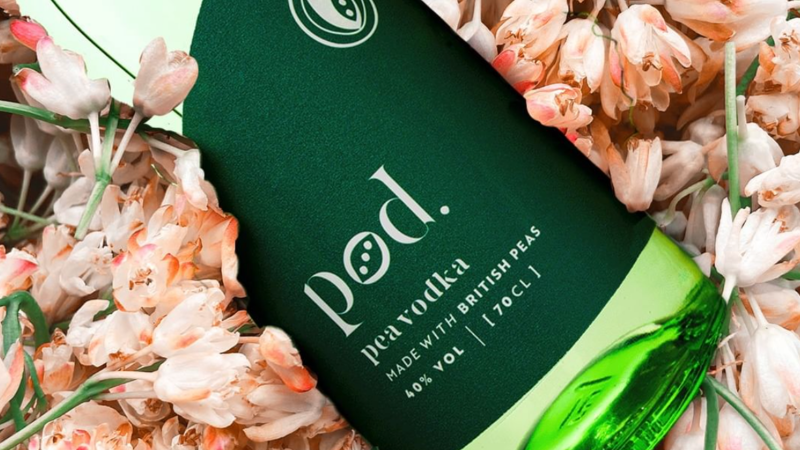
Credit: Instagram @podpeavodka
Launched in 2023, Pod Vodka is all about keeping things climate-positive through locality. It's made in Manchester, using peas from the Somerleyton Estate in Suffolk. (Peas themselves are a "nitrogen-fixing" crop, helping to restore nitrogen levels in the soil to reduce the need for fertilisers. Who knew?) The bottle is made from UK-sourced glass that would otherwise be processed further, cutting down on carbon emissions, and the Pod crew are also working on turning pea pulp, the by-product of the vodka's production, into protein powder for pet food. Helping the health of our planet and our pups? We approve.
Agave
Mijenta Tequila
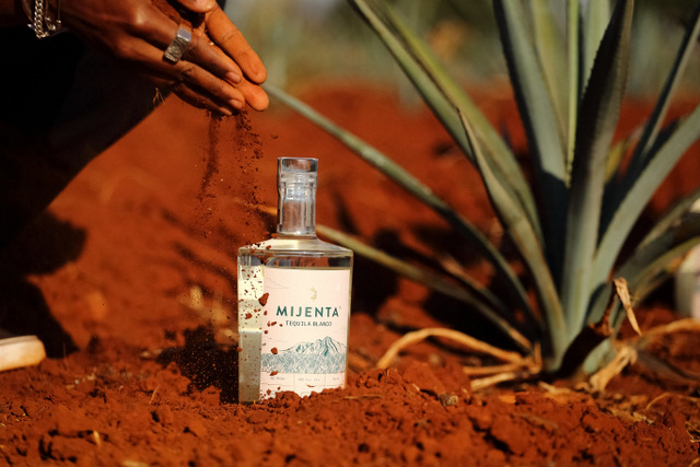
Man, we love us a tequila - especially one with a commitment to environmental sustainability and support for the local community. Mijenta (pronounced "mee-hen-ta", FYI) is inspired by the term “mi gente”, meaning “my people”. This B Corp-certified brand is all about repping a collective mindset, being part of a community of likeminded people. Their ethos is that they should do everything in their power to reverse the environmental impact of creating their spirit, so all the paper-related components of their product (like the label and box) are made from agave waste, and they actively support local businesses and communities by purchasing all packaging elements from Mexico. They're also v keen to look after their land (it's what creates the agave for them to make this kick-ass spirit) so they've kept it all totally organic.
The Lost Explorer Mezcal
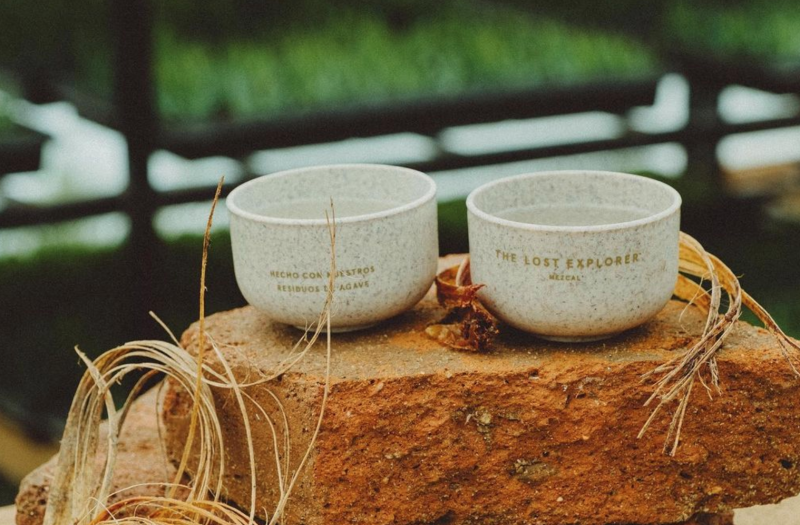
The Lost Explorer Mezcal launched in the UK in October 2020 with a mission to become one of the most sustainable mezcal brands in the world - and it's doing a pretty killer job. The team have focused on using the agave waste produced in the making of their mezcal to create organic compost that's used to fertilise the agaves in the replanting process (in which they plant three agaves for every one that's harvested). They also use it to manufacture adobe, which is a sustainable building material (and they're pretty sure this is the first of its kind using agave waste). It's also made into copitas, AKA the sipping cups used to drink mezcal. And the sustainability doesn't stop there. The brand's bottles are designed and made in Mexico City from more than 50% recycled crystal scraps, with a stopper made of natural certified wood before being sealed and stamped with biodegradable natural beeswax that has been sustainably harvested. Absolutely smashing it, amigos.
...and beyond
Avallen Calvados
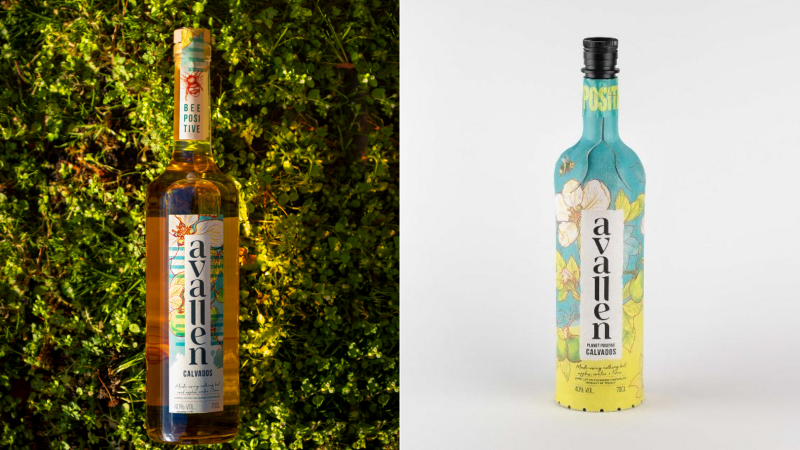
Our peeps at Avallen are all about treating the planet right. Each bottle of this epic French brandy removes 2.73kg of CO2e from the atmosphere - the equivalent of driving 21km in a car. And that's without any extra offsetting, because this stuff is made from nothing but apples and water (fermented then distilled, natch), and apple trees are serious carbon sinks. We love to see it. Their juice is hella sustainable, but that's not the end of the story. They've also brought out a bottle made from 94% recycled paper, which massively cuts the product's carbon footprint, and they participate in 1% for the Planet, donating funds from every bottle sold to organisations that champion bee preservation. Absolutely buzzing.
Originally published in October 2021
Updated 18/04/2023